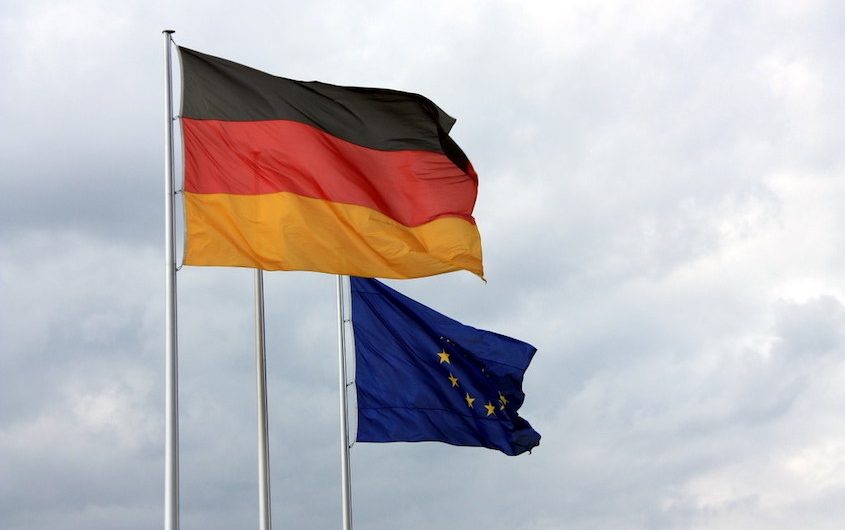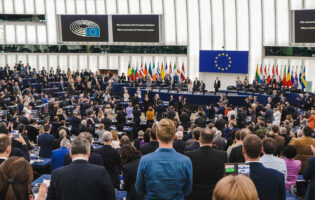
Márcio Cabral de Moura via Flickr
Globally Connected and Resilient – Thinking Foreign Economic Policy Strategically

Andreas Nick
German Bundestag
Andreas Nick has been a CDU member of the German Bundestag since 2013. He serves on the Committee on Foreign Affairs and is rapporteur for the Council of Europe, the United Nations, issues of global order and cybersecurity, as well as regional rapporteur for Turkey, Hungary, and South America. In addition, he is a substitute member of the Finance Committee and the Digital Agenda Committee. Dr. Nick was elected to the Bundestag following a professional career in banking. His final positions were as head of M&A at Sal. Oppenheim Jr. and Cie. and as professor of corporate finance at the Frankfurt School of Finance and Management. Dr. Nick holds a Master’s Degree and a Doctorate in business administration from WHU Otto Beisheim School of Management in Vallendar, as well as a Master of International Public Policy (MIPP) from the Paul H. Nitze School of Advanced International Studies (SAIS) of the Johns Hopkins University in Washington, DC.
Foreign and economic policies of most states can hardly be considered two separate spheres. In an increasingly multipolar world order, the return of geostrategy in the sense of 19th century-style great power rivalry will be accompanied by a growing importance of geoeconomic issues. Economic strength and technological competence are becoming ever more relevant as currencies of power and sovereignty, as compared to traditional categories of military strength. More and more states are proactively using economic policy instruments to enforce their geopolitical interests, by force if necessary.
This poses a serious challenge to the hitherto prevailing paradigm, according to which growing economic relations and interdependence will inevitably lead to a stabilization of international relations. If the “control of flows, such as of people, capital, services and information, is more important than the pacification of territories,” as Herfried Münkler put it, one-sided dependencies of states are likely to be deliberately exploited by others in pursuit of their own interests. Whether in the trade in goods, in the supply of raw materials, but also the movement of capital and the movement of persons and migration, and not least in the cyber and information space: any growing asymmetry or relative weakness in these areas creates potential strategic vulnerabilities. The “connectivity wars” prophesied by Mark Leonard are looming.
With the rise of China in particular, for the first time free market economies are facing a global systemic competition by a new type of state capitalism—a model that is proving to be economically successful and rather competitive, at least in the foreseeable future. Ian Bremmer already aptly described the challenges for the traditionally market-oriented system in his 2010 book “The End of the Free Market.” But what conclusions do we draw from this? Do we remain in a state of shock and reflexive defensiveness when it comes to our current economic policy, or are we prepared to rethink our own approach to the role of the state for the purpose of infrastructure and technological innovations?
Technology and innovation, especially in the digital sector, are increasingly drivers and focal points of systemic rivalry in the age of geoeconomics. They are therefore by no means “geopolitically neutral,” as also Ulrike Franke assesses. The CDU/CSU government program therefore concludes: “New technologies do not only determine our everyday lives, but are also a relevant factor in international politics.” For the CDU/CSU, therefore, the question of the role of the state in international economic policy also arises, particularly with regard to technological innovations and investments in infrastructure. This applies especially to industries influenced by significant network effects.
To cope with these challenges, we need a more strategic approach to foreign economic policy. In the emerging international system rivalry, Europe must not accept that its foreign, security, economic, and technology policies may be imposed from the outside. It has to be capable of pursuing its own interests. This means, on the one hand, being able to make political decisions truly independently and, on the other hand, being able to remain resilient when facing pressure such as coercive economic measures from outside. It is in Germany’s own interest to resolutely promote and shape the EU’s path to “Weltpolitikfähigkeit” (Jean-Claude Juncker) .
In the emerging international system rivalry, Europe must not accept that its foreign, security, economic, and technology policies may be imposed from the outside. It has to be capable of pursuing its own interests.
In practice, these developments demand four priorities:
First, the EU must strategically use free trade agreements as a geoeconomic policy instrument. Europe’s strongest asset or bargaining chip in the world of geoeconomics is access to the EU’s single market. The EU must think beyond the so-called “Brussels Effect,” as Finnish-American trade expert Anu Bradford has called it. The EU can use this leverage of its sizable market to exercise significant international regulatory power in many areas and “export” its standards globally, for example with the General Data Protection Regulation (GDPR). Key players such as global internet platforms have started to adopt these rules as global standards to secure continued access to the EU’s single market.
The EU single market is still the largest and most attractive in the world. This gives the EU a significant opportunity to use free trade agreements much more strategically. Based on the example of the European-Canadian Economic and Trade Agreement (CETA), additional regulatory elements in the fields of Labor safety and environmental protection can be incorporated into free trade agreements in the pursuit of global minimum standards. However, even CETA has so far not been ratified. The pending EU-Mercosur trade agreement is a neglected opportunity for realizing our strategic objectives with partners in Latin America. Similarly, free trade agreements with Africa would be a key milestone in the implementation of the UN 2030 Agenda for sustainable development.
Second, Germany and the EU must set international standards. They need to continue to pursue their commitment to a free, secure, and rules-based world order, especially in the context of World Trade Organization (WTO) reform. Our model of prosperity depends on a functioning global trade order based on a level playing field with clear rules. It is therefore not enough for the EU to limit itself to a role as moderator in the system conflict between the United States and China. Rather, it must actively shape international rules and standards on the basis of its own geopolitical and geoeconomic strengths. The CDU/CSU program provides key starting points here: With regard to China, this means making clear “that genuine partnership […] is only possible within the framework of fair competition on equal terms and by upholding the principle of reciprocity.” Concerning the United States, the program says “Our goal is a comprehensive transatlantic economic, trade and innovation area. To preserve the technology leadership of the value-based West, we must closely coordinate our cutting-edge research and product application.”
Third, the EU must preserve and strengthen not only its innovative power, but also its soft power as a science region. Science and technology form key elements and power factors in international system competition. To remain competitive, the EU must further develop its connectivity. Internally, this requires far more ambitious support for research and development and the expansion of digital infrastructure. Only when EU member states, with the goal of building a successful digital ecosystem in sight, see their economic and innovative strength as a joint asset, can the EU unleash its geoeconomic potential. Externally, the European connectivity agenda must also specifically strengthen ties with value partners worldwide, for example with greater engagement in the Indo-Pacific region and Latin America.
Fourth, Europe needs increased economic resilience and robustness. We must strengthen our resilience towards coercive economic and trade policy measures such as extraterritorial sanctions. Additionally, economic and political countermeasures are needed. The EU Commission’s development of a European “anti-coercion instrument” is welcomed.
Lastly, we cannot avoid systematically reducing imbalances in international economic and trade relations. Clearly, an economic decoupling of the EU from Chinese markets would be neither practicable nor desirable. However, we must limit the attack vectors of adversarial global powers. This applies in particular to the area of advanced technologies, intellectual property protection, and the data security of European citizens.
Globally connected and innovative, but also resilient—this must be the German and European compass and aspiration for the age of geoeconomics. We may still have a time window of 10 to 15 years left, in which Europe can still punch above its weight economically. Europe urgently needs to protect and develop our common economic and innovative strength in a more targeted way and become aware of its potential to project this strength to the outside world. It will be up to the next Federal Government to pursue this route more effectively.
An extended German version of this op-ed appeared in “Civis mit Sonde” (02-2021).









